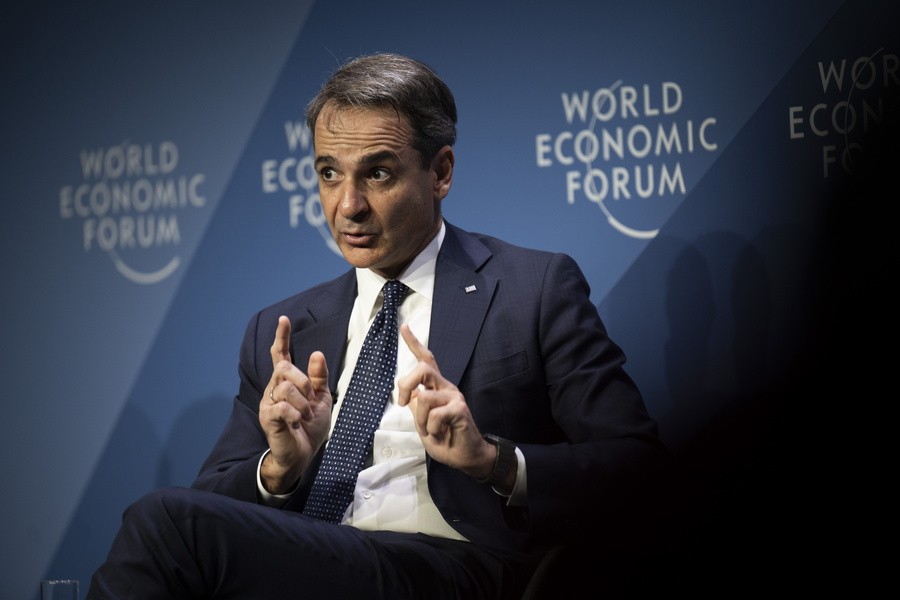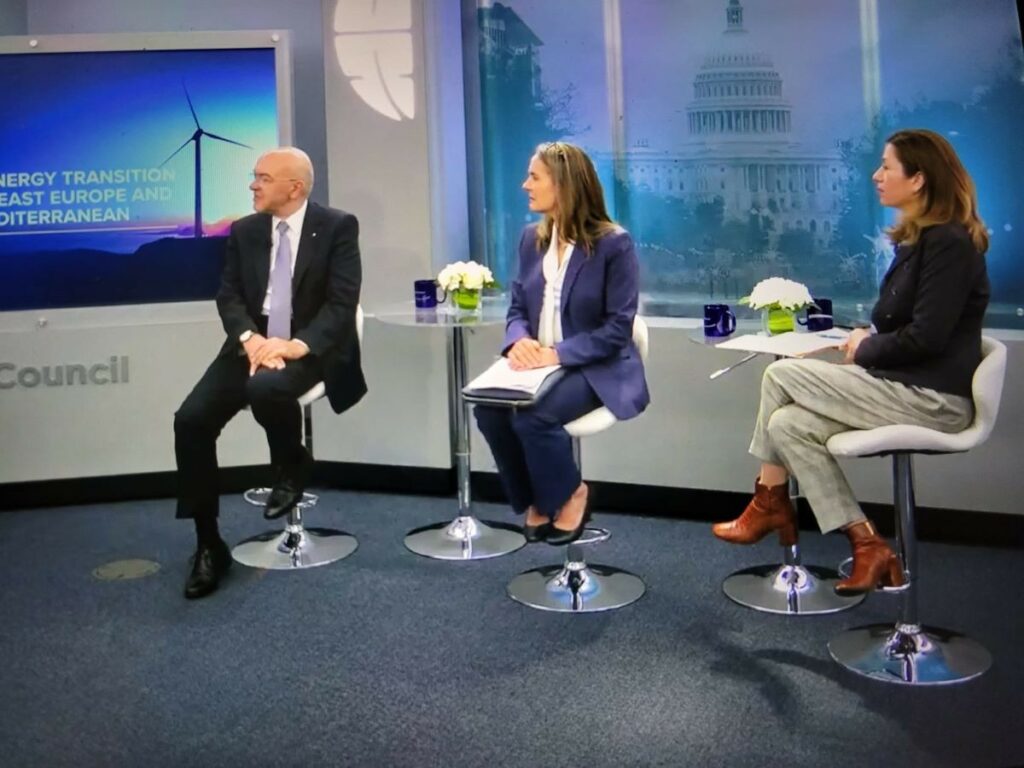
New Atlantic Council Report: Recommends Strengthening the US-Greece Partnership on Energy Transition

Ο υφυπουργός Εξωτερικών Φραγκογιάννης, η αξιωματούχος του Στέιτ Ντιπάρτμεντ Μαρία Όλσον και η δημοσιογράφος Κατερίνα Σώκου. Φωτογραφία Hellas Journal via You Tube
Report details how to transform Greece into a regional energy hub in Southeastern Europe and the Eastern Mediterranean while identifying energy projects of high priority to advance the energy transition and security.
WASHINGTON, DC – May 18, 2022 – The Atlantic Council’s Europe Center today released an insightful new report offering recommendations for further strengthening US-Greece cooperation on the energy transition. The report—Squaring the Energy Transition Circle in Southeast Europe and the Eastern Mediterranean—was informed by a year-long research effort involving private interviews, roundtables, and other outreach efforts with stakeholders in the United States, Greece, and beyond.
This report comes at a pivotal time for the region’s energy security. Europe is in the midst of an energy crisis that has been fueled by Russia’s invasion of Ukraine, hurting consumers and businesses alike. Doubling down on renewable energy sources is a critical part of the response since it can reduce Europe’s energy dependency on Russia, while helping to mitigate the effects of climate change in a region that is especially vulnerable to its effects. Greek Prime Minister Kyriakos Mitsotakis met with President Joe Biden in the White House on Monday, where energy security and climate change was highlighted as a key area of further cooperation, making this an opportune time to build on US-Greek cooperation on energy.
To further support Southeastern Europe’s energy security and accelerate its energy transition, the report makes several key recommendations for US policymakers, including to:
Continue to support Greece’s transformation into a regional energy hub, including through projects that contribute to energy diversification and the integration of the pipeline network in Southeast Europe, a region where gas markets are less interconnected and more reliant on Russia.
Leverage Greece’s ambitious green transition targets and its position as a top producer of renewable energy to increase green energy production in the region, including by using the Energy Hydrogen Shot to develop renewable hydrogen that can be exported to Central Europe from or via Greece.
Work closely with Greece to identify energy projects of high priority and develop flexible and innovative solutions of financial support from official and other sources, including from the Development Finance Corporation.
Support electricity interconnectors between Europe, Asia, and Africa to transmit an increasingly green share of electricity from Israel, Egypt, and beyond, opening the European market to renewable energy from Southeastern Europe as a region that is particularly impacted by climate change.
In his first statement on the issue of energy since his confirmation hearing, H.E. George Tsunis, the new US Ambassador to Greece said about the report:
“I want to congratulate Katerina Sokou and the Atlantic Council team for pulling together this excellent policy paper, with fantastic support from the American Hellenic Chamber of Commerce and their energy member companies, as well as our great colleagues and partners in the U.S. and Greek governments. The paper also comes at an important moment, when Europe is reevaluating its energy mix and acknowledging what Greece recognized many years ago – reliance on Russia for energy makes countries more vulnerable. I couldn’t be more excited as the U.S. Ambassador to work together with our partners in Greece and American industry leaders at this critical time to advance our shared energy and climate goals while supporting the growing leadership role Greece is playing as a driver of energy security in the Eastern Mediterranean, Western Balkans and beyond. The U.S.-Greece relationship has never been more consequential.”
Squaring the Energy Transition Circle in Southeast Europe and the Eastern Mediterranean was authored by Atlantic Council nonresident senior fellow Katerina Sokou.
“At a time when energy lies at the heart of the global geopolitical calculus, Greece has emerged as one of the United States’ most important partners for achieving European energy security,” said Sokou. “The alignment of interests between the United States and Greece extends beyond the current crisis, to the opportunities of the energy transition and the need to address climate change and is deeply rooted in their joint interest to help ensure security and drive prosperity in the Balkans and the Eastern Mediterranean region.”
Today’s official launch event featured Mr. Konstantinos Fragkogiannis, Deputy Minister of Foreign Affairs of the Hellenic Republic, Mr. Joshua Volz, Deputy Assistant Secretary at the US Department of Energy, and Ms. Maria Olson, Director of the Office of Southern European Affairs of the US Department of State.
Ακολουθήστε τη HELLAS JOURNAL στη NEWS GOOGLE

